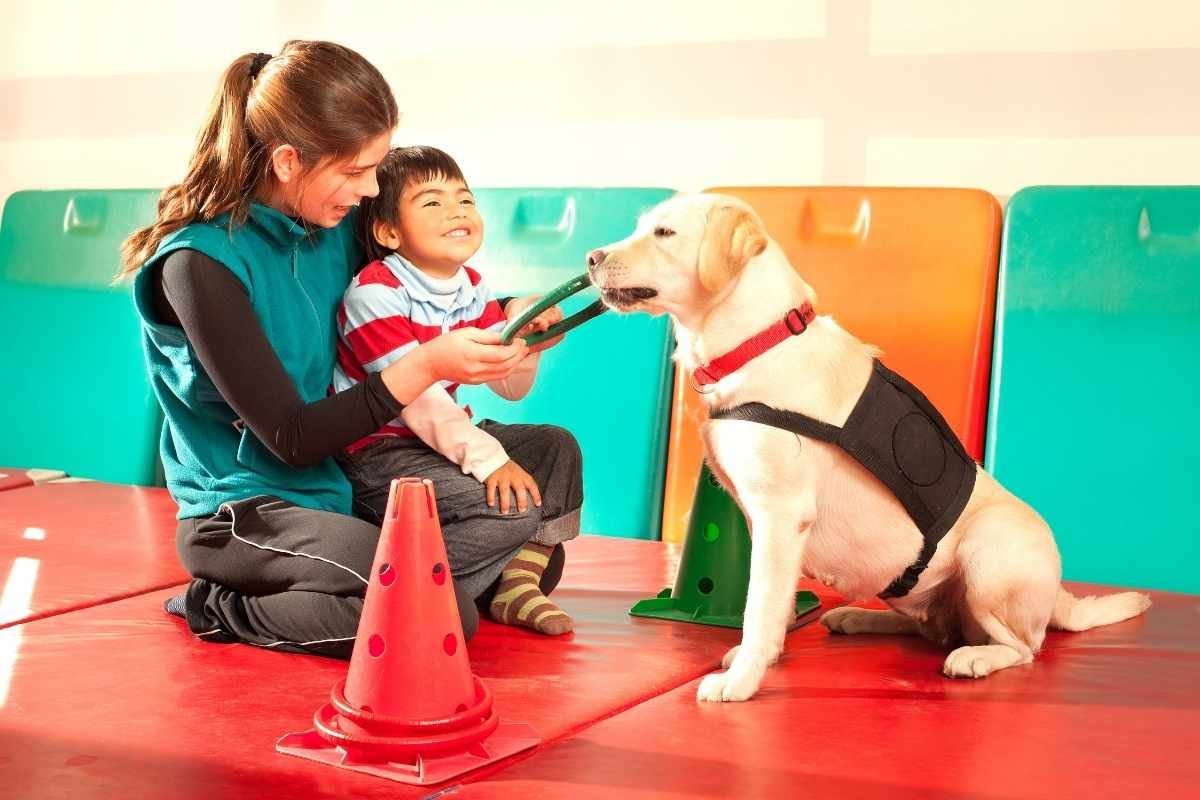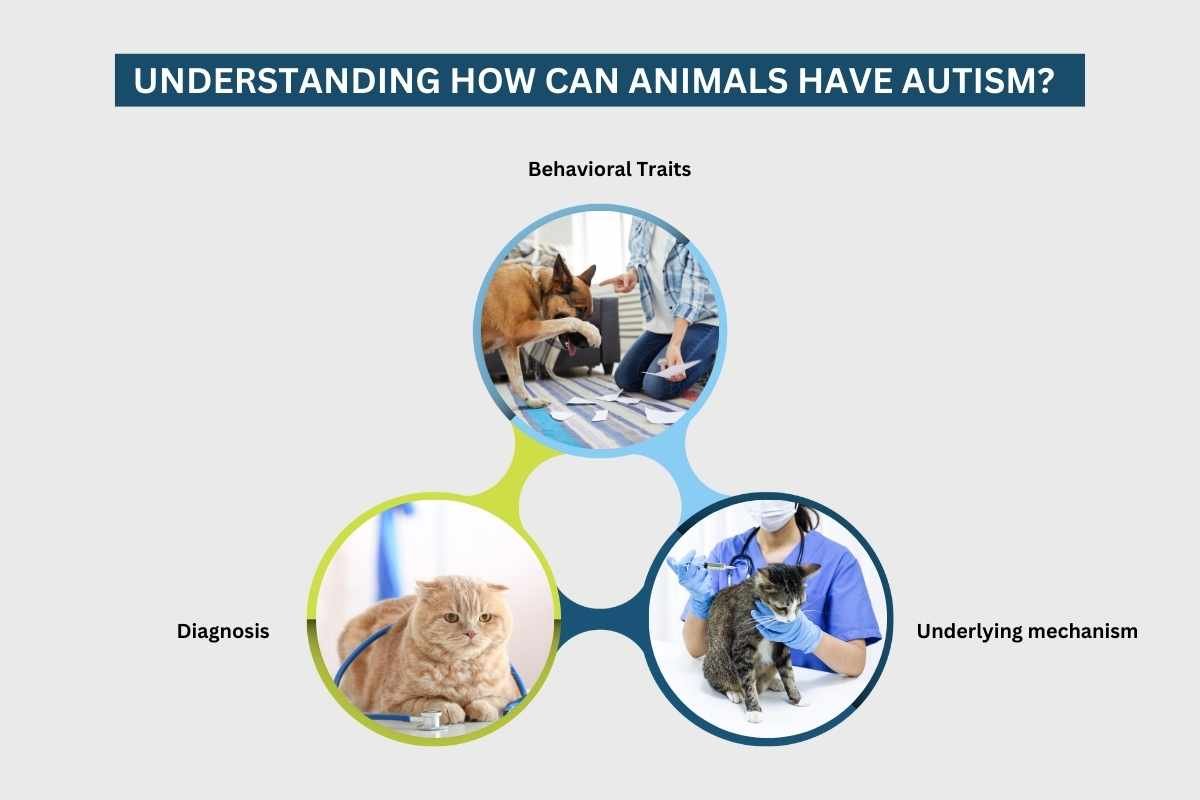Animals are considered the best companions humans can have. These furry little creatures can be energetic and playful at times, and some can be quiet and grumpy. They often exhibit some common personality traits like humans, especially in dogs and cats. But have you ever seen your dog getting puzzled by other dogs or your cat repeatedly licking their paws? These can be some of their quirky habits, but what if it’s more than that? Scientists have been working on these habits, which indicate autism-like traits.
This raises the question: can animals have autism? We cannot ask a dog how they are feeling about certain situations to explore similarities in personality traits and behavior in comparison to humans with autism. However, a few animals have contributed to the study of cognition and the diverse ways brains can function. To get the answer to the question and uncover this mystery of whether animals experience autism, let’s get more into this topic.
In this article, we will shed light on the autistic behaviors that can be found in animals and understand how animals can show symptoms of autism in them.
What is autism?

Autism, also known as autism spectrum disorder (ASD), is a complex developmental disability that changes the way a person behaves, interacts with others, communicates, and learns in comparison to others. As it affects an individual in different ways and varies in degrees, it is called spectrum disorder. People with autism may have various characteristics, such as they can have difficulty in social interaction and initiating conversations. Also, find verbal and nonverbal communication challenging, like understanding facial expressions or body language.
An individual with autism often have restrictive interests and repetitive behavior; they have an intense and focused interest in a specific topic or object. They also indicate repetitive behavior such as hand-flapping, rocking, or a strict adherence to routine. They can be over-sensitive toward sounds, lights, or textures. In humans with ASD, there can be clear indications. However, it gets difficult to determine these traits in animals, which brings us back to the question that is can animals have autism.
Understanding how can animals have autism?
Autism is a neurodevelopment condition found in humans, and a few of the criteria for diagnosis can include a delay in language development. However, this can’t be applied directly to the animals. Some animals do display autistic-like traits, such as a tendency towards repetitive behavior or atypical social habits. As mentioned, animals don’t experience autism the way humans do, but they do display behaviors that are similar to some symptoms of autism spectrum disorder, such as:

1. Behavioral Traits:
Some animals, especially dogs, often display traits like repetitive behavior, difficulty in social interactions, or sensory sensitivity, which can also be seen in humans with autism.
2. Underlying mechanism:
It is essential to remember the underlying cause of this and how these traits can get manifested in different animals due to their distinct cognitive and social abilities.
3. Diagnosis:
There is no proper test that has been developed to diagnose autism in animals. However, veterinarians and animal behaviorists have identified autism-like behaviors, but it is not the same as a formal diagnosis of ASD in humans.
Research of animal models for autism study:
There is research conducted using animal models to understand more about autism spectrum disorder. As animal models are very vital in every research field, they found some similarities in a few animals that indicated autistic behavior. Scientists have used animals such as rodents to study more aspects of autism-like traits, including social interaction and communication deficits. These animal models have contributed to understanding the genetic and environmental factors that lead to ASD by helping scientists in research. The animal model didn’t fully replicate the complexity of human autism. However, they have given a few resourceful insights into this disorder.
Animals with autistic traits:
The common animals, according to research, have shown that Dogs and cats are more likely to display autism symptoms. They don’t show human-like visible indications, but some subtle behavioral traits can be observed in them that can be similar to humans with autism. These are a few pointers that indicate and answer the question of whether can animals have autism.
Dogs:
1. Antisocial Behaviors:

One of the often-displayed symptoms can be antisocial behavior. Autistic dogs avoid any interaction with other dogs and humans, showing a lack of interest in their surroundings. They may not actively seek social interactions, as they prefer staying by themselves.
2. Communication Issues:
Communication can be another issue that can be observed in dogs with autism. Autistic dogs have difficulty expressing their moods and emotions like other dogs. Because of these issues, it becomes harder for their owners to understand and connect with them.
3. Repetitive Behaviors:
Autistic dogs may display repetitive motions, obsessive-compulsive behaviors, and inappropriate reactions to stimuli at times, which is not common in comparison to typical dogs. These behaviors can include chronic tail-chasing, circling, obsessive chewing, and overreacting to touch or sounds.
Conclusion:
The question that has popped up and gathered the attention of many people is, can animals have autism? To answer it, animals do not display direct indications but have shown subtle autistic-like behavioral traits, which makes us ponder if animals can experience autism. Many research scientists have observed many symptoms of autism spectrum disorder, such as repetitive behavior, challenges in interaction, difficulty in developmental behaviors, and expressing their moods and emotions. However, how fascinating it is to uncover many mysteries in our furry little friends. Sometimes, their usual action can indicate something uncommon, leading to many discoveries.
FAQ:
1. Do some animals have autism?
Just like humans, dogs can also exhibit signs of autism. While autism in dogs is not as well-studied as it is in humans, some certain behaviors and traits may indicate the presence of autism-like characteristics in our canine companions.
2. Can pets be autistic?
While dogs cannot be diagnosed with autism in the same way as humans, they can exhibit certain behavioral conditions that share similarities with autism. These conditions are often referred to as autism-like behavior in dogs or canine behavioral conditions.
3. Can cats have autism?
The short answer is no. There is no scientific evidence to suggest that cats can animals have autism. However, cats can exhibit behaviors that are similar to those seen in humans with autism.






